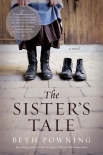The Sister's Tale by Beth Powning (the best novels to read .TXT) 📗

- Author: Beth Powning
Book online «The Sister's Tale by Beth Powning (the best novels to read .TXT) 📗». Author Beth Powning
NINE Someone Who Talks Back
IT WAS PITCH DARK by five o’clock in the afternoon. A hanging paraffin lamp made the dining table shine like a stage in the shadowed room. Flora set down a bowl of stew; steam furled as she lifted the lid.
Hands, reaching for ladle. For salt and pepper shakers.
“I seen your light down on the corner, Mr. Sprague,” murmured Miss Harvey, lifting her fork with ink-stained fingers.
“I endeavour to please,” he said. He fussed through his stew with the tines of his fork, turning over pieces of potato, carrot, turnip.
Flora left and returned with a covered bowl of buttermilk biscuits. She set down the bowl in front of Jasper Tuck. He glanced her way. Keeps to himself, Flora thought, with a pang of hurt. Even though they had spoken together a few times, he did not acknowledge her as anything other than a servant.
She checked the table. Pitcher of tea. Milk and sugar. Butter on a covered china plate. Water in Josephine’s plainest glassware. Dilly beans in a dish. Sweet pickles, sliced cheese.
“That fellow who was here, George Francis Train,” Mr. Sprague said. He took a breath, preparing to hold forth. He was fascinated by The Comet, as Train referred to himself, who had exposed the pauper auction. Flora paused on her way out, pretending to inspect the candles. “We thought he was a crank—but you know he truly did go around the world in eighty days. I was reading about it. New York to San Francisco, seven days. Clipper ship to Yokohama, then over to Singapore. Up to France, across to Liverpool, back to New York. Imagine that. And he really did own a town in Omaha. He really did have a mansion in Newport, Rhode Island. I seen a picture of it.” He paused to break open a biscuit, reached with a knife for a pat of butter. Lips pursed, he spread his biscuit with tiny dabs. Silver and glassware gleamed in the pool of light. “He’s fallen on hard times now. Gone bust.”
Flora ate her stew in the kitchen, along with Josephine, Ellen and Maud. Occasionally, she rose to check the boarders’ progress. She cleared the table, served tapioca pudding, listened for the scraping of chairs and the thud of footfall—into the parlour, up the stairs.
When the dishes were done, Josephine bid them goodnight, saying she had a headache and was going to bed. Maud and Flora exchanged glances. The quieter Josephine became, the more, it seemed, her grief deepened.
Maud decided to study in the kitchen, where it was warm. Ellen settled in her rocking chair with her knitting.
“Couldn’t you sell those, Ellen?” Flora asked.
“Who would want my old mittens, now,” Ellen said. Her voice was exasperated, as if her mittens, like herself, were without value, and it had been rude of Flora to point this out.
“I didn’t—”
“Anyone can make a mitten.” A thumb was growing, stitches shifting from needle to needle on a spiky triangle.
The two girls exchanged another glance. Neither understood the reason for Ellen’s unpredictable moods, yet they were complicit in their tolerance. Flora untied her apron and hung it on the back of the door, feeling that she had space within herself to absorb Ellen’s prickly retorts. She had a room of her own, a quarterly stipend now, all the food she could eat, and a status in the household that revealed itself like a plant, its growth imperceptible but steady.
“I’m going up to read,” Flora said.
Maud ran a hand down the seam of her open book, smoothing. “Come down if you need help.”
Flora caught Ellen’s sharp observance and felt a sear of frustration. Ellen wanted Flora to remain forever at the back of the house, in the kitchen, a procurer of needs, whereas she expected to see Maud finish her education, marry, and have a house such as this one had been before Simeon’s death.
“You learned to read,” Maud remarked, also noticing Ellen’s expression.
“Yes, but I know my place.” The rocking chair and the needles went faster.
“What a thing to say, Ellen. If Flora wants to become educated, there’s every reason in the world she should. Don’t you be like one of those—”
Maud paused, pursuing her thought.
“Look at what they did to Mother when the will couldn’t be found. Those men. With their laws. Saying she had to go to court to claim her own children as hers.”
Flora went up the back stairs into the chill of the hallway. One dim gaslight mounted on the wall illuminated the spruce floorboards. Josephine’s door was cracked open for heat; she could see a slice of light. Her own room was freezing. She wrapped herself in a yellow and brown plaid shawl and sat at a small table. She had stood the books that Maud had brought her from the school so that their spines were impeccably aligned. Embossed titles gleamed, golden.
The Practical Speller.
An English Grammar with copious and carefully graduated exercises.
Literary Extracts.
A Practical Introduction to Arithmetic.
Shavings dropped into the wastebasket as she sharpened her pencil with a small knife.
She began writing out tonight’s spelling words: obvious, thorough, simplicity, courageous, impetuous, field, yield, incessant.
She worked until she could no longer keep her eyes open, writing these words over and over, until both penmanship and spelling were perfect.
—
Every Saturday, Flora had a half day off. She felt guilty.
“I could do the baking,” she said. She had put her apron on, pretending to forget that it was Saturday.
“Go,” Josephine said. She did not meet Flora’s eyes, as if to open herself to sympathy was a thing she could not bear. She





Comments (0)